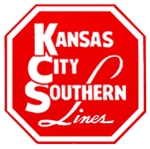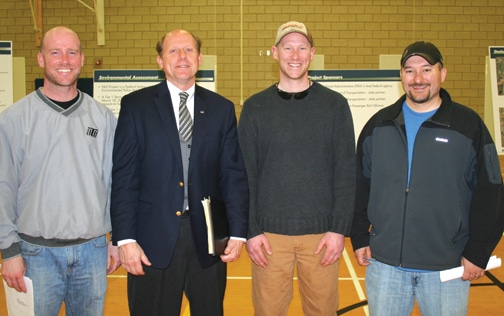The SMART Transportation Division’s Anaheim, Calif., regional meeting began July 29 with a town hall forum at which SMART members were able to pose questions directly to the union’s leadership.
More than 500 members, guests and presenters are attending the regional meeting.
After opening ceremonies and remarks from SMART General President Joe Nigro and Transportation Division President Mike Futhey, the presidents were joined by SMART General Secretary-Treasurer Joe Sellers and Transportation Division Assistant President and General Secretary & Treasurer John Previsich to respond to questions concerning the merger of the United Transportation Union and the Sheet Metal Workers International Association and other issues.
The session was moderated by Transportation Division International Vice President John Lesniewski.
In his opening remarks, Nigro announced that the union has launched a new website that can be found at smart-union.org. As SMART continues to incorporate various elements of the SMART TD (former UTU) website into smart-union.org, Transportation Division members can still visit www.utu.org for membership news and information.
The two presidents confirmed that delegates to the union’s transportation division will be attending two conventions in 2014.
From June 30 to July 2, Transportation Division delegates will be attending a convention in San Diego, Calif., to elect officers of the Transportation Division and to approve recommendations for changes to the SMART Constitution.
The SMART Constitution is near completion, but several elements of the final document remain before Georgetown University law professor and arbitrator Michael H. Gottesman. His ruling, which is expected later this year, will determine the language of the final SMART Constitution.
Transportation Division delegates will also participate in SMART’s first convention following the merger of the United Transportation Union and the Sheet Metal Workers International Association, working side-by-side with delegates from the SMWIA. That convention will be held August 11-15 in Las Vegas.
Both Nigro and Futhey stressed the importance of all delegates fully participating in both the Transportation Division and SMART conventions. “The conventions will provide delegates the opportunity to be a part of the final constitutional approval process,” Futhey said.
The smart-union.org website will soon feature a “Frequently Asked Questions” section to answer members’ concerns about the SMART Constitution, convention and other issues.
Author: paul
The oil industry and U.S railroads are resisting the Obama administration’s attempt to boost safety standards for the type of rail car involved in a fiery, fatal explosion in Canada, citing costs and technical challenges.
Industry groups say it is impractical to retrofit tens of thousands of existing tank cars used to haul oil, even as they have adopted voluntary standards to ensure that cars ordered after October 2011 meet tough requirements recommended by federal transportation experts following a deadly ethanol train derailment and explosion in Illinois two years earlier.
Read the complete story at madison.com.

The “minor” dispute ruling is significant because the Railway Labor Act prevents unions from exercising self-help over minor disputes.
The finding by Judge Elizabeth Erny Foote against the SMART Transportation Division and the Brotherhood of Locomotive Engineers and Trainmen was that the KCS had an arguable contractual justification for its actions. According to the ruling, the contractual justification is based on the carrier’s existing use of stationary surveillance cameras in various train yards and other locations, inward-facing cameras in crew vans that transport KCS crews to and from train assignments, and procedures for monitoring and recording phone calls between train crew employees and crew management regarding reporting to work.
The judge also held that it was not “frivolous to argue that the safety challenges posed by employees using personal electronic devices on the job necessitate the camera and review system proposed by KCSR.”
Once it was determined the case was a “minor” dispute, the two unions argued for a “status quo” injunction pending resolution of the dispute before an arbitrator. Judge Foote denied the argument.
SMART Transportation Division President Mike Futhey expressed displeasure with the ruling saying, “Unfortunately, the law now is such that it is quite difficult to get a judge to find that a major dispute exists in these type situations. The fight is not over. We will continue to press the issue to protect our members’ rights. We believe that an arbitrator looking at this situation will see it as an extreme overreach by the carrier.”
To view Judge Foote’s ruling, click here.

According to the Toronto Star, fears remain that many of the missing may have been vaporized into dust, never to be seen again.
This incident has called into question the transport of hazardous freight across small towns and communities through tens of thousands of miles of rail lines from coast to coast and between borders.
Savage Industries, based in Utah, transports cargo and hazardous materials throughout the country with rail and over the road freight operations.
On November 8, 2005, the operator of a Savage Industries Mack TX Tandem Haul Truck was fatally injured when the truck left a mine haul road, ran through a guard rail and overturned. Additionally, according to a DOT/FRA letter (Z2013-NS-2-020076) on March 1, 2013 Savage Industries transported a rail car across Route 9 in Bear, DE without permits.
Please call Howard Goodman at 801-944-6600 and tell him that Savage needs to protect the local communities that his freight travels through and that we and our families live in. You can also email him through the link below.
Accidents like what happened in Quebec are preventable. It is up to all of us to make sure they never happen again, especially people like Howard Goodman whose company is responsible for the safety of the millions of Americans who live along the lines his company transports its cargo on.
Click here to take action
JACKSONVILLE, Fla. — President Barack Obama in a speech in Jacksonville, Fla., Thursday urged Congress to pass a bill to fund infrastructure projects and investments.
Obama delivered the speech, his third consecutive talk on the economy, at the Port Terminal Building at Jacksonville Port, home to two projects the administration expedited — a container terminal and a rail yard, The Hill reported.
Read the complete story at UPI.com.
GALVA, Kansas — The crew of a passing freight train is getting the credit for spotting an overnight fire that damaged a middle school in central Kansas.
Authorities believe lightning started the fire at Canton-Galva Middle School. Damage was confined to the gymnasium, where flames left a large hole in the roof while charring the walls and floor.
Read the complete story at The Republic.
Crashes are traumatic for both victims and the railroad employees who witness the tragedies unfold.
An average freight train has 100 cars and at least two engines, a total package weighing as much as 6,000 tons. Traveling at 55 mph, such a train takes at least a mile to come to a stop, according to U.S. Department of Transportation data.
Read the complete story at the Des Moines Register.
Local 202, Denver, Colo.
The members of this local are asking for donations to assist the family of 40-year member John D. Velasquez, whose wife, Louise, is in need of liver and kidney transplants. She is suffering from non-alcoholic, fatty liver disease. “John was planning on retiring this spring, but expenses may prevent that from happening,” said Colorado State Legislative Director Carl Smith. Donations may be made by contacting Westminster Federal Credit Union at (303) 427-6466, or mailing them to Louise Velasquez Benefit – WFCU, 9053 Harlan St., Ste. 10, Westminster, CO 80031. Visit https://www.facebook.com/LiveLoveIlluminate?ref=hl on Facebook for more information.
Local 204, Pueblo, Colo.

Local 243, Fort Worth, Texas
Secretary & Treasurer Cameron Callum reports that this Union Pacific local has already donated $500 dollars to the Tornado Relief Fund established by Local 1188 in Oklahoma City, Okla., to assist members who suffered losses in and around Moore, Okla. “The money will go directly to our affected brothers and sisters. I hope the international gets something put out to publicize this fund,” Callum said.
Local 544, Havre, Mont.
The local is sponsoring a three-day event in the beautiful Bears Paw Mountains consisting of camping, entertainment and a fantastic barbecue, according to Picnic Chairperson Amy Preite. “This is an ideal time for our members, new and old, to come together with their families and friends. Three days will allow all to attend without missing work,” Preite said. Donations from designated legal counsel and businesses within the community will be used for prize giveaways. Planned events include meals, music, a 50-50 duck race and kids’ day. Attendees are asked to bring salads and desserts to help defray costs. Email Preite at Amy.Preite@bnsf.com for the event schedule.
Local 866, Rawlins, Wyo.

Local 662, Richmond, Va.
Following a special election held in April, Jamie Rainier has been elected local secretary and Cecil Pinner has been elected local treasurer, former Secretary & Treasurer Jimmy Galbraith reports. In April, Pinner attended the local treasurer’s workshop held at the International in North Olmsted, Ohio, and received valuable training for the position. In other news, Galbraith noted the retirement of member and General Chairperson Jim Townsend (GO 201) after 30 years of service and the death of retired member Troy E. Ball in February. He also praised the work of members Everette J. Ready (Afghanistan), Edward Chappell and David Grizzard, who are serving on active duty in the National Guard.
Local 1000, Minneapolis, Minn.

Local 1043, Sparks, Nev.
Former retired Local Chairperson Lee Wilkes reports that his friend and mentor, Alumni Association member and former Local Chairperson Robert C. Patterson, 79, died April 11. He was buried with military honors.
Local 1608, Chatsworth, Calif.
The members of this Los Angeles Metro bus local are mourning the sudden death of fellow member Shenita Coleman May 5, Local Secretary Jack Dedrick reports. Coleman worked for Los Angeles MTA as a bus driver for 17 years and is survived by her husband, Harvey, son Raphael, and daughters Ranita and Tamara.
Local 1892, Houston, Texas
This Union Pacific local has amended its bylaws, effective in May, and all members should be receiving copies with a return receipt mailed to the secretary & treasurer. Local Chairperson Dan Holak reports. The local has also produced a “welcome booklet” for new members explaining unions, the SMART TD’s structure, grievances, representation rights and other important information. Holak said that the local has a “time claims information” help sheet explaining how to file non-service time claims. Members who have not received this information should contact him at (832) 795-3827, or Secretary & Treasurer Keith Green at (832) 969-2252, for a copy.
At least 78 people have been killed in the passenger train derailment in northwestern Spain on July 24.
More than 140 were hurt, 36 seriously, after all eight carriages of the Madrid to Ferrol train came off the tracks near Santiago de Compostela.
Read the complete story at British Broadcasting Corporation.

Although the cause of the accident in Lac-Mégantic remains unknown at this time, Transport Canada is moving forward to build upon the safety advisories received last Friday from the Transportation Safety Board and further enhance existing safe railway operations and the security of railway transportation.
Effective immediately, the emergency directive requires all rail operators to:
Ensure that no locomotive attached to one or more loaded tank cars transporting dangerous goods is operated with fewer than two qualified persons on a main track or sidings;
Ensure that no locomotive attached to one or more loaded tank cars transporting dangerous goods is left unattended on a main track;
Ensure, within five days of the issuance of the directive, that all unattended controlling locomotives on a main track and sidings are protected from unauthorized entry into the cab;
Ensure the directional controls, commonly known as reversers, are removed from any unattended locomotives, preventing them from moving forward or backward, on a main track or sidings;
Ensure that their company’s special instructions on hand brakes are applied to any locomotive attached to one or more cars that is left unattended for more than one hour on a main track or sidings;
Ensure that, in addition to complying with their company’s special instructions on hand brakes referred to in the item immediately above, the automatic brake is set in full service position and the independent brake is fully applied for any locomotive attached to one or more cars that are left unattended for one hour or less on a main track or sidings.
The safety of Canadians is Transport Canada’s top priority. The department is committed to working with the rail industry to examining any other means of improving rail safety.
Transport Canada has been in contact with the railway industry, and in particular with CN, CP and the Railway Association of Canada (RAC), to work together to promote the continued safety of Canada’s rail system.
The majority of railways maintain a culture of safety and security, as shown by the notable decline in derailments and train accidents over the past few years.
Transport Canada inspectors will continue to work in cooperation with the Transportation Safety Board as it conducts its investigation.
Transport Canada inspectors are at Lac-Mégantic determining whether there has been non-compliance with regulatory requirements.
Railway safety regulations exist to ensure the safety and protection of the public. If these regulations were not followed, the department will not hesitate to take action.
Transport Canada is responsible for transportation policies and programs. It promotes safe, secure, efficient and environmentally-responsible transportation. Transport Canada reports to Parliament and Canadians through the minister of Transport. It works with its portfolio partners, other government departments and jurisdictions, and industry to ensure that all parts of Canada’s transportation system work well.
The complete release, along with Related Items, can be found here.
